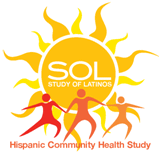Hispanic Community Health Study / Study of Latinos
The Hispanic Community Health Study / Study of Latinos (HCHS/SOL) is a multi-center epidemiologic study in Hispanic/Latino populations to assess the role of acculturation in the prevalence and development of disease, and to identify factors playing a protective or harmful role in the health of Hispanics/Latinos. The target population of 16,000 persons of Hispanic/Latino origin, specifically Cuban, Puerto Rican, Dominican, Mexican, and Central/South American, were recruited through four Field Centers in Miami, San Diego, Chicago and the Bronx area of New York.
During 2008-2011 study participants aged 18-74 years underwent an extensive clinic exam and assessments to determine baseline risk factors. Annual follow-up interviews are conducted to determine health outcomes of interest and the first re-examination of the cohort (2015-2017) is nearing completion. Planning for a potential 3rd cohort examination has begun.
HCHS/SOL welcomes ancillary studies and scientific collaboration in the evaluation of HCHS/SOL data. Engagement of early career scientists is encouraged. Approximately 13,000 consenting HCHS/SOL participants were extensively genotyped. Analyses of these data by HCHS/SOL genetic epidemiology working groups and investigators from collaborating consortia are underway. Cross-study collaborations are welcome.
Study results are being disseminated through scientific journals and also conveyed to the communities involved in the study in order to improve public health at the local level. HCHS/SOL is sponsored by the National Heart, Lung, and Blood Institute (NHLBI) and six other institutes, centers, and offices of the National Institutes of Health (NIH) contributed to the first phase of the project.
During 2008-2011 study participants aged 18-74 years underwent an extensive clinic exam and assessments to determine baseline risk factors. Annual follow-up interviews are conducted to determine health outcomes of interest and the first re-examination of the cohort (2015-2017) is nearing completion. Planning for a potential 3rd cohort examination has begun.
HCHS/SOL welcomes ancillary studies and scientific collaboration in the evaluation of HCHS/SOL data. Engagement of early career scientists is encouraged. Approximately 13,000 consenting HCHS/SOL participants were extensively genotyped. Analyses of these data by HCHS/SOL genetic epidemiology working groups and investigators from collaborating consortia are underway. Cross-study collaborations are welcome.
Study results are being disseminated through scientific journals and also conveyed to the communities involved in the study in order to improve public health at the local level. HCHS/SOL is sponsored by the National Heart, Lung, and Blood Institute (NHLBI) and six other institutes, centers, and offices of the National Institutes of Health (NIH) contributed to the first phase of the project.
Website: https://sites.cscc.unc.edu/hchs/
Acronym: HCHS-SOL
Clinical Centers: 4
Participants: 16,000
Beginning:
Ending:
Funding: NHLBI
Study Design: Population-based prospective cohort follow-up
